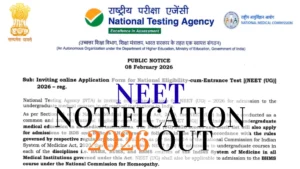NEET Chemistry Notes 2026: Cracking the most popular medical exam, i.e., the NEET UG, becomes easier when you prepare Chemistry smartly with the right notes. That’s why we have created well-organized NEET Chemistry Notes to make your preparation smoother and faster. In this article, students will find chapter-wise notes for Physical, Organic, and Inorganic Chemistry, along with important formulas, key reactions, shortcuts, and solved examples. These notes use simple language so that even difficult concepts are easy to revise. You can also check important topics, chapter weightage, and quick revision tips to improve your score. With these notes, Chemistry won’t seem difficult anymore.
NEET Chemistry Notes 2026
The National Eligibility cum Entrance Test for Undergraduate (NEET-UG) is the main exam for admission into MBBS, BDS, AYUSH, and other medical courses in India. Chemistry is crucial because it can significantly improve overall scores if students prepare properly. The syllabus covers Physical, Organic, and Inorganic Chemistry from both Class 11 and 12 NCERT books, so it is essential for students to study each topic thoroughly.
Having clear and organized NEET Chemistry notes is a major benefit. These notes make revision quicker, help students remember formulas and reactions, and clarify concepts. They serve as a helpful guide for last-minute preparation, boosting students’ confidence and performance on the exam.
Why are NEET Chemistry Notes Helpful?
The NEET Chemistry Notes are helpful for all the students taking part in the upcoming NEET UG Exam. Students can check why they are required to check the NEET Chemistry notes before starting their preparations:
- They include all the key topics from NCERT Class 11 and 12, which form the base of NEET Chemistry.
- Notes make revision simple and faster, especially during exam days.
- Important formulas, reactions, and mechanisms are highlighted for easy recall.
- They save valuable time during last-minute preparation by giving a quick overview.
- With clear concepts, they help reduce mistakes and improve overall NEET performance.
NEET UG Chemistry Syllabus 2026
The NEET UG Chemistry Syllabus is important for exam preparation because it includes topics from both Class 11 and Class 12 NCERT books. It covers Physical, Organic, and Inorganic Chemistry, featuring chapters like thermodynamics, equilibrium, chemical bonding, hydrocarbons, coordination compounds, and biomolecules.
Students can use this syllabus to organize their studies by chapter, concentrate on high-weightage topics, and create useful revision notes. Sticking to the official syllabus helps them avoid unnecessary topics and stay focused on the exam. For more clarity, we have provided the detailed NEET 2026 syllabus for Organic, Inorganic, and Physical Chemistry in the table below. This way, students can review every chapter and prepare effectively for NEET UG.
NEET 2026 Inorganic Chemistry Syllabus
Below we have tabularized the NEET Inorganic Chemistry syllabus, which includes all the topics from both class 11th and 12th.
| Class XI – Inorganic Chemistry – 22% | ||
|---|---|---|
| Inorganic Chemistry NEET syllabus | Number of Questions | Chapter-wise Weightage in % |
| Chemical Bonding | 4 | 9% |
| P-Block Elements | 3 | 7% |
| Periodic Table & Periodicity in Properties | 2 | 4% |
| Hydrogen | 1 | 2% |
| S-Block Elements | 1 | 3% |
| Class XII – Inorganic Chemistry – 12% | ||
| Coordination Compounds | 3 | 6% |
| D and F-Block Elements | 2 | 4% |
| Metallurgy | 1 | 2% |
| Qualitative Analysis | 1 | 2% |
NEET 2026 Organic Chemistry Syllabus
The detailed NEET Organic Chemistry syllabus, along with the chapter-wise weightage, including all the topics from class 11th and 12th with the number of questions asked, has been shared in the table below:
| Class XI – Organic Chemistry – 8% | ||
|---|---|---|
| Organic Chemistry NEET syllabus | Number of Questions | Chapter-wise Weightage in % |
| Hydrocarbons | 2 | 4% |
| General Organic Chemistry | 2 | 5% |
| Class XII – Organic Chemistry – 26% | ||
| Haloalkane | 1 | 2% |
| Aldehydes, Ketones, and Carboxylic Acids | 2 | 3% |
| Polymer | 1 | 2% |
| Alcohol, Phenol, Alkyl Halide | 2 | 4% |
| Aromatic Compounds | 3 | 6% |
| Biomolecules | 2 | 4% |
| Carbonyl Compounds | 2 | 4% |
| Organic Compounds Comprising Nitrogen | 2 | 3% |
| Chemistry in Everyday Life | 2 | 3% |
| Environmental Chemistry | 1 | 2% |
| IUPAC & Isomerism | 2 | 4% |
| Practical Organic Chemistry | 1 | 2% |
NEET 2026 Physical Chemistry Syllabus
Below we have tabularized the NEET Physical Chemistry syllabus, which includes all the topics from class 11th and 12th with the number of questions asked from each chapter and their weightage in the NEET Examination.
| Class XI – Physical Chemistry – 17% | ||
|---|---|---|
| NEET Physical Chemistry Class XI Chapters | Average Number of Questions | Chapter-wise Weightage |
| Mole Concept | 2 | 5% |
| Atomic Structure & Nuclear Chemistry | 1 | 3% |
| Gaseous State | 1 | 3% |
| Thermodynamics & Thermochemistry | 1 | 3% |
| Chemical Equilibrium | 1 | 3% |
| Ionic Equilibrium | 2 | 4% |
| Redox Reactions | 1 | 2% |
| Class XII – Physical Chemistry – 15% | ||
| Solid State | 1 | 3% |
| Solutions & Colligative Properties | 2 | 4% |
| Electrochemistry | 1 | 3% |
| Chemical Kinetics | 2 | 4% |
| Surface Chemistry | 1 | 2% |
Benefits of Using NEET UG Chemistry Notes 2026
There are many benefits of using the latest NEET UG Chemistry Notes as they help in a better understanding of the NEET Exam Pattern, and types of questions asked. Some of them have been discussed below:
- Quick Revision – Notes help in revising formulas, reactions, and concepts in less time.
- Easy to Understand – Complex topics are explained in simple language for better clarity.
- Chapter-wise Coverage – Every important topic from Physical, Organic, and Inorganic Chemistry is included.
- Time-Saving – Saves students from going through bulky books again and again.
- Boosts Accuracy – Helps in remembering key points, reducing silly mistakes in exams.
- Exam-Oriented – Focuses on NCERT-based topics and previous year’s important questions.
- Better Retention – Well-organized notes improve memory recall during the exam.
How can Students Choose the Best NEET Chemistry Notes?
For NEET preparation, Chemistry is a scoring subject if studied with the right notes. Since the syllabus is vast, students should pick notes that are simple, NCERT-focused, and exam-friendly. The best notes save time, make concepts easy to revise, and help in remembering important formulas and reactions. But how can you select the right ones? Here are some useful tips:
- NCERT-based content – The notes should strictly follow Class 11 and 12 NCERT books, as most NEET Chemistry questions are directly based on them.
- Clear and concise – Good notes explain concepts in simple language, with short definitions, formulas, and reactions.
- Well-organized – Notes should be chapter-wise and topic-wise, making it easy to revise.
- Highlight important points – Short tricks, exceptions, and key reactions should be highlighted.
- Practice questions included – Notes with solved examples, PYQs (previous year questions), and MCQs are more effective.
- Revision-friendly – They should allow quick last-minute revision before the exam.












 NTA NEET 2026 Notification OUT at neet.n...
NTA NEET 2026 Notification OUT at neet.n...
 NEET Preparation Strategy 2026: Detailed...
NEET Preparation Strategy 2026: Detailed...
 Free NEET Sample Papers 2026 PDF | Downl...
Free NEET Sample Papers 2026 PDF | Downl...







